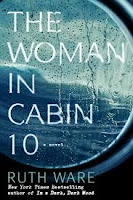After finishing The Woman in Cabin 10, it's a little interesting that I went next to another immensely readable (but ultimately somewhat forgettable) novel. With Dark Matter, I took a sci-fi turn, devouring the modern-day Sliders (with a slight twist) in a single day.
What ultimately, for me, places Dark Matter into pleasurable "fluff" sci-fi rather than what I consider compelling science-fiction is that it treads little new ground in its technology, view of the world, or analysis of human behavior. The novel centers around Jason Dessen, a brilliant scientist who gave up the academic pursuit for a stable home life with his wife Daniela and teenage son. On the way home one night, he's kidnapped by a masked man and transported to a parallel universe--one in which he gave up the family life to pursue an academic career. He's determined to return to his home universe, particularly once he realizes the parallel universe's Jason (whom he calls Jason2) has taken up the original Jason's place with his family.
The first part of the novel follows the familiar "disoriented protagonist" line as Jason attempts to figure out where he is and what's going on--and then escape the clutches of Jason2's lab. I was a little surprised how easily Jason2's lab becomes textbook villainous, even murdering several people in an attempt to capture Jason. I mean, I get that they've invested a lot of time and energy into their parallel universe machine and are desperate to preserve their work (and get information from the new Jason), but casually arranging outsiders' murders? It also immediately implies Jason2 is straightforwardly evil, erasing any chance of nuance with his character.
Once Jason escapes and re-enters the machine, we kick into the Sliders zone as he attempts to find his home world. We're told that the parallel universes he visits are close off-shoots of his own world, yet he manages to visit the most extreme scenarios: an infectious disease apocalypse; a weather apocalypse; a lot of apocalyptic scenarios. I mean, how likely is a zombie-esque apocalypse in any of our futures? The fact that he seems to mostly explore these highly treacherous parallel universes rather than a universe where he chose tan curtains over brown is partially explained by the fact that his mental state (highly agitated, obviously) is supposedly "choosing" worst-fear scenarios, but I still don't totally buy it.
Though the rest is plenty fun, it's only once Jason reaches his home world that the book takes its most interesting turn. All of Jason's time in the parallel universe box has resulted in many parallel Jasons, meaning that he's not the only "Jason" from his home world to return home. Instead, dozens of Jasons, identical to the narrator Jason except for differing Slider experiences, all reach the home world, and they're all seeking to depose Jason2 and retake their place with Daniela and Charlie. So which one "deserves" the family life? Finally, an intriguing question (albeit one that's somewhat glossed over at the end).
[an aside: Jason2 also traveled inside the box seeking the parallel universe he eventually kidnapped Jason from. Wouldn't his travels also have resulted in dozens of Jason2s being created? So shouldn't there be tons of Jasons and tons of Jasons2 all fighting it out?]
Ultimately, Dark Matter is fun but not exceptional, good for someone seeking a fairly fast-paced and action-filled--but not especially complicated--sci-fi adventure.
I've always loved books, but "adult" life seemed to get in the way. Now I'm making time to read and falling in love all over again.
Wednesday, March 29, 2017
Monday, March 20, 2017
"The Woman in Cabin 10" by Ruth Ware
I read The Woman in Cabin 10 for a book club, and I went in to the novel wary. Whodunit thrillers aren't typically part of my reading repertoire, and I was unexcited to wade through a couple hundred pages of stupid fluff. Yet, while The Woman in Cabin 10 certainly isn't literary or ground-breaking, I did find it to be a fun and enjoyable distraction.
The novel is narrated by Lo Blacklock, an up-and-coming travel reporter booked to cover the maiden voyage of a small luxury cruise ship. A few days before the trip, Lo's apartment is broken into; shocked from the attack, she begins the cruise nervous and sleep deprived.
[an aside: Did I miss something, or was Lo's break-in never explained? We learn later that {spoiler} the original cabin 10 occupant's home was also broken into shortly before the trip in order to keep that occupant from attending the cruise--thus leaving cabin 10 empty. I had assumed we'd discover Lo had also been purposefully attacked for the same reason, only it didn't work out? But I don't believe that was the case? Is it really supposed to just be a coincidence it happened right before the trip?]
The first night of the trip, Lo is awakened by a sound and is convinced a woman has been thrown overboard. She's even more convinced when the woman in cabin 10--whom she had borrowed mascara from earlier that evening--never appears again and her existence is denied by everyone else on board.
At first (and, okay, perhaps throughout) I found Lo rather grating. She's utterly sleep-deprived the entire novel, yet she continues to nervously drink heavily. It drove me crazy. STOP DRINKING AND GO TO SLEEP. I know that sleepy/drunk haze is supposed to color Lo's (and the reader's) understanding of what is happening, making us both question her judgment, but still, wouldn't any sane person STOP DRINKING?!
Then there's Lo's "mental illness," i.e. (medicated and controlled) depression/anxiety, which is so common as to be utterly unremarkable yet somehow is used as justification for her unreliability. Ware can't seem to decide whether she wants to argue that depression and anxiety are totally normal or that they're a matter of deep concern. Given how many people healthily function on a regular basis with both, I found the inclusion of it problematic.
[aside #2 since I don't feel like this fits appropriately anywhere: one night, Lo is accosted at her room door by Ben Howard, a former boyfriend. They've both been drinking, but Lo is clear and insistent in rejecting his advances. He continues anyway, roughly groping her, until she has to physically attack him back to get him off her. Yet they both end up in her room, apologizing, and later team up to investigate the murder {okay, she also thinks he is the murderer for awhile, but still}. Like in so many books, we have clear sexual assault depicted as nothing more than annoying and forgivable drunken behavior.]
But despite the fact that Lo would NOT GO TO SLEEP, the mystery at the heart of Woman in Cabin 10 is still fun, even when laughably silly. I mean, the "killer" sneaks into Lo's spa room while she's (conveniently) asleep after a massage to write "Stop digging" in the steam on the bathroom mirror (so, [insert evil cackle] all evidence of the message is gone once the steam dissipates! Hahahahah!). The killer is suitably evil, and the ending is suitably adventurous, and though I was no more enlightened about the world when I finished, I had passed the time enjoyably enough.
The novel is narrated by Lo Blacklock, an up-and-coming travel reporter booked to cover the maiden voyage of a small luxury cruise ship. A few days before the trip, Lo's apartment is broken into; shocked from the attack, she begins the cruise nervous and sleep deprived.
[an aside: Did I miss something, or was Lo's break-in never explained? We learn later that {spoiler} the original cabin 10 occupant's home was also broken into shortly before the trip in order to keep that occupant from attending the cruise--thus leaving cabin 10 empty. I had assumed we'd discover Lo had also been purposefully attacked for the same reason, only it didn't work out? But I don't believe that was the case? Is it really supposed to just be a coincidence it happened right before the trip?]
The first night of the trip, Lo is awakened by a sound and is convinced a woman has been thrown overboard. She's even more convinced when the woman in cabin 10--whom she had borrowed mascara from earlier that evening--never appears again and her existence is denied by everyone else on board.
At first (and, okay, perhaps throughout) I found Lo rather grating. She's utterly sleep-deprived the entire novel, yet she continues to nervously drink heavily. It drove me crazy. STOP DRINKING AND GO TO SLEEP. I know that sleepy/drunk haze is supposed to color Lo's (and the reader's) understanding of what is happening, making us both question her judgment, but still, wouldn't any sane person STOP DRINKING?!
Then there's Lo's "mental illness," i.e. (medicated and controlled) depression/anxiety, which is so common as to be utterly unremarkable yet somehow is used as justification for her unreliability. Ware can't seem to decide whether she wants to argue that depression and anxiety are totally normal or that they're a matter of deep concern. Given how many people healthily function on a regular basis with both, I found the inclusion of it problematic.
[aside #2 since I don't feel like this fits appropriately anywhere: one night, Lo is accosted at her room door by Ben Howard, a former boyfriend. They've both been drinking, but Lo is clear and insistent in rejecting his advances. He continues anyway, roughly groping her, until she has to physically attack him back to get him off her. Yet they both end up in her room, apologizing, and later team up to investigate the murder {okay, she also thinks he is the murderer for awhile, but still}. Like in so many books, we have clear sexual assault depicted as nothing more than annoying and forgivable drunken behavior.]
But despite the fact that Lo would NOT GO TO SLEEP, the mystery at the heart of Woman in Cabin 10 is still fun, even when laughably silly. I mean, the "killer" sneaks into Lo's spa room while she's (conveniently) asleep after a massage to write "Stop digging" in the steam on the bathroom mirror (so, [insert evil cackle] all evidence of the message is gone once the steam dissipates! Hahahahah!). The killer is suitably evil, and the ending is suitably adventurous, and though I was no more enlightened about the world when I finished, I had passed the time enjoyably enough.
Subscribe to:
Comments (Atom)

